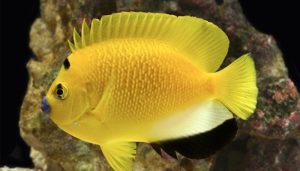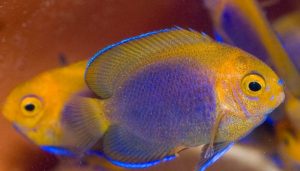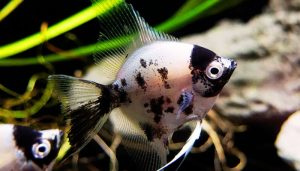Why does my betta fish have a white spot? If you’ve noticed Betta Fish White Spots appearing on your beloved pet, it’s natural to feel alarmed. These tiny, white specks are often more than just a cosmetic issue; they can be a telltale sign of an underlying health problem that demands immediate attention.
Whether you’re a seasoned aquarist or a first-time Betta owner, understanding the causes and remedies for white spots is crucial to ensuring the health and happiness of your fish.
Ich white spots on Betta fish are commonly associated with ich, a parasitic disease that can quickly spread if left untreated. However, other factors like fungal infections or water quality issues could also be at play.
The good news? With the right approach, you can tackle this problem effectively and restore your Betta’s vibrant health. But, how to treat white spots on betta fish?
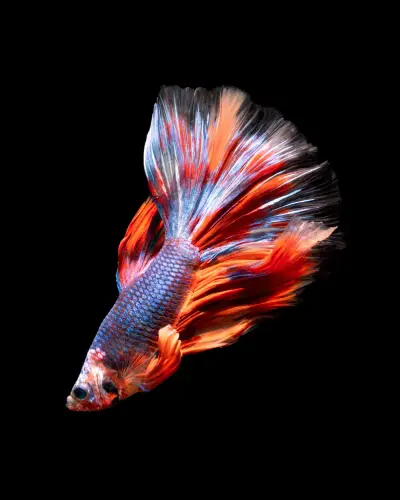
In this guide, we’ll explore everything you need to know about diagnosing, treating white spots on betta fish body, and preventing ich white spots on betta fish. From recognizing early warning signs to implementing proven remedies, you’ll gain the confidence to act swiftly and protect your aquatic friend.
Dive in to learn how to create a healthy and thriving environment for your Betta!
Table of Contents
ToggleWhy Is My Betta Fish Getting White Spots?
Your Betta fish may get white spots due to a parasitic disease called ich (short for Ichthyophthirius multifiliis). This disease is caused by a parasite in most freshwater aquariums and can attach to a new aquarium fish when it is introduced to the tank or when the water quality is poor.
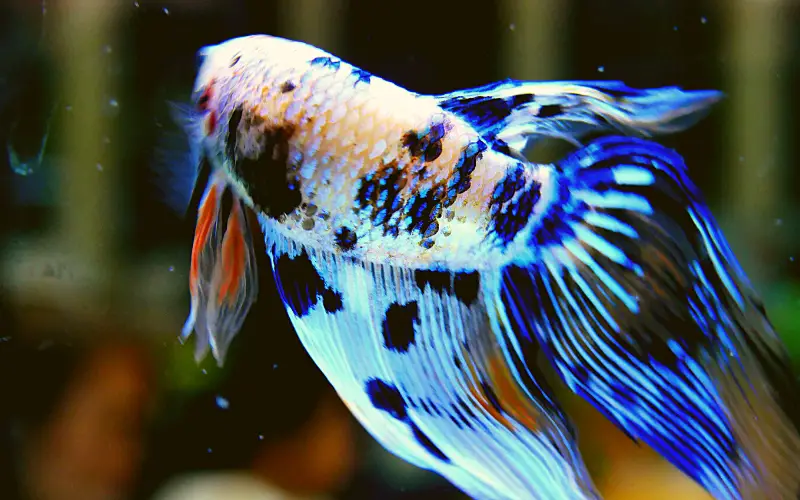
Stress can also trigger an outbreak of ich in fish. The parasite’s initial stage is the trophont, which attaches to the fish and feeds on its tissues, causing the white spots. If left untreated, ich can be deadly and kill your fish, so acting quickly is essential.
What is Ich, and Do I Have Infected Fish?
What are the white spots on my betta fish? Ich, Also Called Ick (short for Ichthyophthirius multifiliis), is a highly contagious parasitic disease affecting many freshwater fish species, including bettas.
Stages of the Ich Lifecycle
How Does Ich Reproduce? The parasite’s life cycle consists of three stages: the trophont, tomont, and the front.
The parasite’s initial life cycle stage is the trophont, which attaches to the host fish and feeds on its tissues. This is when the white spots appear on the fish’s body, fins, and gills.
The second stage is when the parasite detaches from the fish and forms a protective cyst. Finally, the cyst ruptures, releasing hundreds of theronts that attach to new fish and start the cycle all over again.
Causes of Ich White Spots on Betta Fish
Ich is caused by a parasite that is present in most freshwater aquariums. When introduced to the tank, the parasite can attach to a new fish or when the water quality is poor.
Stress can also trigger an outbreak of ich in fish. In addition, ich is highly contagious, so if one fish in your tank has it, others will likely become infected with ich.
Symptoms of Ich Betta Fish White Spots
The most noticeable symptom of ich is the appearance of white dots on the fish’s body, fins, and gills. These spots look like tiny grains of salt or sugar and can be difficult to see on dark-colored fish.
Other symptoms of ich include clamped fins, lethargy, loss of appetite, and rapid breathing.
How To Cure White Spots on Betta Fish?
White spots on a betta fish are often a sign of ich, a common parasitic infection. For treating ich in betta fish, start by isolating the affected fish in a separate quarantine tank to prevent the spread of the parasite.
Gradually raise the water temperature in the tank to about 80–82°F (27–28°C), as this can help disrupt the ich life cycle. Ensure the tank water is clean and well-aerated, as higher temperatures can reduce oxygen levels.
Next, treat the tank with a medication specifically designed for ich, which can be found at most pet stores. Follow the instructions on the product label carefully, as overdosing can harm the fish.
Salt can also be added to the water as a supplementary betta fish white spot treatment, but use aquarium-safe salt and ensure the dosage is appropriate for betta fish. Continue treatment for at least a week or until the betta white spot disappear, even if symptoms seem to improve earlier, as this ensures all stages of the parasite are eradicated.
After the betta fish ich treatment, gradually return the fish to its main tank, ensuring it is clean and stable. Monitor the fish for signs of recurrence and maintain good water quality to prevent future outbreaks.
Betta Ich or Fungus?
Determining whether your Betta fish has ich or fungus can be challenging, as both conditions can cause white spots on a betta fish body. However, there are some principal differences between the two.
Ich is a parasitic disease that is highly contagious and can spread rapidly throughout an aquarium. On the other hand, fungi is a bacterial, fungal, or parasitic infection that can occur when the fish’s immune system is weakened.
Fungal infections may appear as white or gray patches on the fish’s body, fins, or gills, while ich typically appears as small white spots. A veterinarian or experienced fish keeper can help diagnose the specific condition affecting your Betta Siamese fighting fish.
How Long Can Ich Survive?
The length of time that ich can survive depends on various factors, such as tank water temperature, water quality, and the availability of a host fish. Ich can generally survive for several days to weeks without a host fish.
However, the parasite’s survival time can be reduced by increasing water temperature, using medication, and performing regular water changes to maintain water quality.
Act if you notice tiny white spots on your fish and take steps to prevent the infection from spreading to other fish in your aquarium.
Preventative Measures
Preventing ich on betta fish is always better than treating THE white spot betta fish. Here are some tips to prevent ich from infecting your betta fish:
- Quarantine new fish before introducing them to your tank.
- Keep your aquarium clean and well-maintained.
- Avoid overcrowding your tank.
- Keep the water temperature between 75 and 82 degrees Fahrenheit.
- Feed your betta fish a healthy diet and avoid overfeeding.
Best Ich Treatment for Betta Fish: (7 Treatment Options)
How to treat ick on Betta? If your betta fish has ich, there are several betta fish ich treatment options available. Here are the extremely best ways for treating ich in betta fish:
- 1. Increase the water temperature to between 80 and 82 degrees Fahrenheit. This will speed up the ich parasite’s life cycle, making killing easier.
- 2. Add aquarium salt to the water to help kill the ich parasite.
- 3. Use an ich medication that is specifically designed for betta fish. Follow the instructions neatly and complete the full treatment course.
- 4. Perform regular water changes to keep the water clean and reduce stress on your betta fish.
- 5. Use a medication that contains formalin and malachite green. This will kill the ich parasite quickly and effectively.
- 6. Move your betta fish to a quarantine tank and treat it separately from other fish in your aquarium.
- 7. Add a UV sterilizer to your aquarium. This will kill the ich parasite and prevent it from spreading to other fish.
It’s important to note that only some treatment options are suitable for some fish. If you need help determining which treatment option to use, consult a veterinarian or an experienced fish keeper.
Commonly Asked Questions about White Spot on Betta Fish (FAQs)
Can White Spots on Fish Not Ick?
Yes, white spots on fish may not necessarily be due to ich. Other conditions, such as bacterial or fungal infections, can also cause white dots on betta fish. A veterinarian or experienced fishkeeper can help diagnose the specific condition affecting your fish.
Why Does My Betta Have a Big White Spot?
Why does my betta fish have white spots? Large white spots on Betta fish can signify a fungal or bacterial infection, injury, or tumor. It’s essential to monitor your betta fish closely for any changes in behavior or appearance and seek your nearby veterinary care to determine the underlying cause and appropriate treatment.
Why Is There White Spot on My Betta Fish Fin?
A white spot on Betta fish fin can be a sign of fin rot, a bacterial infection that can cause the fins to deteriorate and turn white. Maintaining good water quality, quarantining sick fish, and using appropriate medication to treat betta fish with white spots.
Why Is There White Spot on My Betta Fish Head?
A white spot on betta fish head can signify a fungal or bacterial infection or an injury. It’s essential to monitor your fish closely for any changes in behavior or appearance and seek pet veterinary care to define the underlying cause and appropriate treatment.
What Does Ick Look Like on Betta Fish?
In the early stage ick on Betta fish, small white spots that resemble grains of salt can appear on the body of the Betta, fins, and gills. As the ick disease progresses, the spots may become larger and more numerous, and the fish may exhibit other symptoms such as lethargy and loss of appetite.
What are the white spots on my betta fish?
White spots on your Betta fish could be ich (Ichthyophthirius multifiliis), a common parasitic infection. Quarantine the fish, raise the temperature, and treat with aquarium salt or medication as directed.
How to treat ich in betta fish effectively?
To treat ich in Betta fish effectively, raise tank temperature to 86°F, add aquarium salt, and use medication like malachite green or copper sulfate as directed for about two weeks.
Can fish recover from white spots?
Yes, white spots betta fish can recover with prompt treatment including raising temperature, using aquarium salt, and administering appropriate medication as directed.
What medication do you recommend for betta fish white spot on fin?
For white spots on a Betta fish’s fin, effective medications include those containing malachite green, copper sulfate, or formalin. Follow dosing instructions carefully for successful treatment.
Can betta fish get ick?
Yes, Betta fish can get ick, also known as ich or white spot disease, caused by the parasite Ichthyophthirius multifiliis. Prompt treatment is essential for their recovery.
Final Thoughts
In conclusion, Betta fish white spots can be a serious and potentially deadly condition if left untreated. However, following the preventative measures and treatment options outlined in this post, you can effectively treat and prevent this condition from harming your Betta fish. It’s essential to keep your aquarium clean, maintain a healthy diet for your fish, and be vigilant in monitoring your Betta fish for any signs of ich. If you notice your Betta has white spots on its body, fins, or gills, act quickly to prevent the fish disease from spreading and seek professional advice if necessary.
Remember to use a combination of betta fish ich treatment options, including increasing water temperature, adding aquarium salt, and using specific medications designed for Betta fish. Doing so can help your Betta fish recover and maintain a healthy and happy life. We hope this exclusive post has been informative and helpful in understanding Betta fish white spots and how to effectively treat and prevent ich on betta fish. Always remember to prioritize the health and well-being of your Betta fish, and never hesitate to seek professional advice if needed.
You might also like
- 7 Warning Signs of a Betta Fish Dying You Need to Know
- How Do I Know If My Betta Is Happy & Why It Matters?
- Betta Fish Fights: Best Environment to Prevent Betta Fight
- Betta Pineconing Diseases (5 Symptoms & Best Treatment)
- Why Is My Betta Fish Turning White? (Symptoms & Curing Tips)
- How to Help a Dying Betta Fish? (7 Reasons Your Bettas Die)
- How to Tell If Betta Fish Is Dying: (5 Warning Signs)
- Betta Ich or Fungus: 7 Signs Your Fish Might Be in Trouble!
- Tumor on Betta Fish 101: Symptoms, Causes & Proven Treatment!


